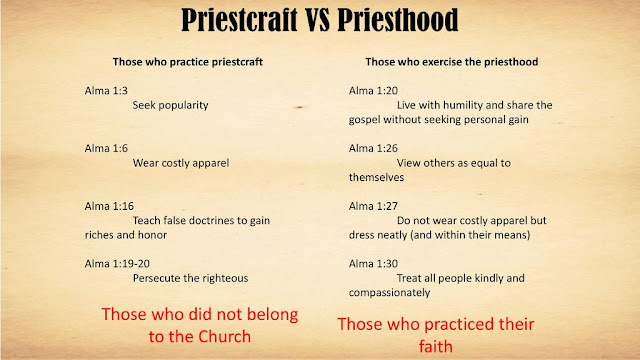 |
| Satan's substitute for priesthood; claiming authority when one has none; the creed of antichrist; ministries set up to glorify oneself and not God. |
Before his death, Mosiah had put in place laws designed to protect freedom of religion. Non-believers had begun to persecute the believers. After the law was passed and the people agreed to it, it became illegal for anyone to persecute another for his or her beliefs. This law also meant that non-believers could not be prosecuted for a teaching a different religious philosophy if, in fact, they believed the philosophy themselves. A man could not be punished for his beliefs.
After the king's death, the system of judges which he had created became the chief adjudicators in Zarahemla. Mosiah's sons were away on a mission to the Lamanites in the Land of Nephi and Alma, the Younger, was the Chief Judge in the Nephite governing body.
During the first year of the Reign of the Judges, a man was brought before Alma. He was a big man, attractive, strong, and charismatic. His name was Nehor.
And he had gone among the people, preaching to them that which he termed to be the word of God, bearing down against the church.(Alma 1: 3)
He taught things such as these:
- Priests and teachers should become popular (like celebrities)
- They shouldn't have to work, but that they should be supported by the people (a paid clergy)
- All men would be saved in the end because God redeems all men that he created
- Therefore, there was no sin and the people should be able to do whatever they wanted without fear or guilt; they should rejoice.
Many people believed him because he excused their sins and offered cheap salvation. He taught what the people wanted to hear, so he became very popular and very rich and full of pride. He organized his followers into a church built around his beliefs. (See Mosiah 1: 3-6) Because he claimed to be teaching something which he truly believed, he could not be prosecuted under the law, even though he did great damage to the people of God.
One day, as he was out preaching, he confronted an old man who was a teacher in the Church of Jesus Christ. That man was Gideon, the man who led the revolt against King Noah. Nehor argued with him, but Gideon held his own and bore pure testimony. This infuriated Nehor because he could see that some of his own followers were listening to Gideon. In his rage, he drew his sword and began to strike Gideon. Because of his advanced years, Gideon could not hold his own in a physical fight and he died at the hand of Nehor.
Many people witnessed this and took Nehor to Alma. He argued his case boldly before Alma, but Alma cut him short. He cited the wrong he had done:
- He was guilty of introducing priestcraft among the people (for which he could not have been tried) but
- He sought to force his beliefs with the sword and, in the process, had murdered an old man. For that crime, he would be punished.
There were so many witnesses of the crime, the Nehor was sentenced to death. He was taken outside the city and executed. Just before he died, Nehor was allowed his last words. He did acknowledge, between the heavens and the earth, that what he had taught the people was contrary to the word of God; and there he suffered and ignominious death. (Mosiah 1: 15)
Nehor's death did not put an end to his "church" and the people increased in wickedness. They set themselves up as priests and teachers to gain wealth, all the time being sure they to stay inside the law; they didn't lie or steal or murder. Even so, they did great damage because they began to look down on the people of God, even though they technically had not committed "crime." By practicing priestcraft in opposition to the priesthood of God's church, they led many people away.
And Alma knew. . ..
© May 2020 Dr. Kathleen Rawlings
Buntin Danielson



No comments:
Post a Comment